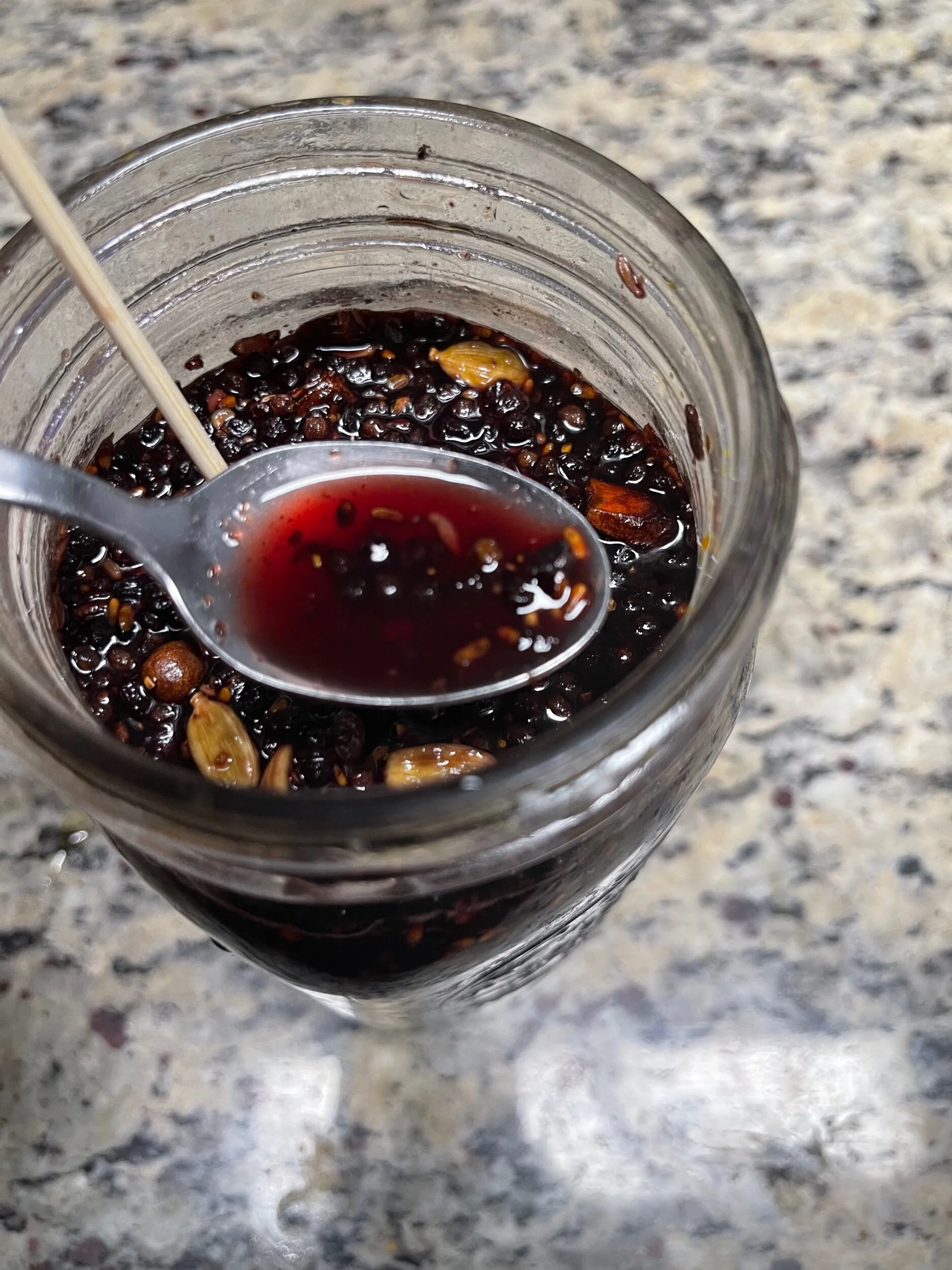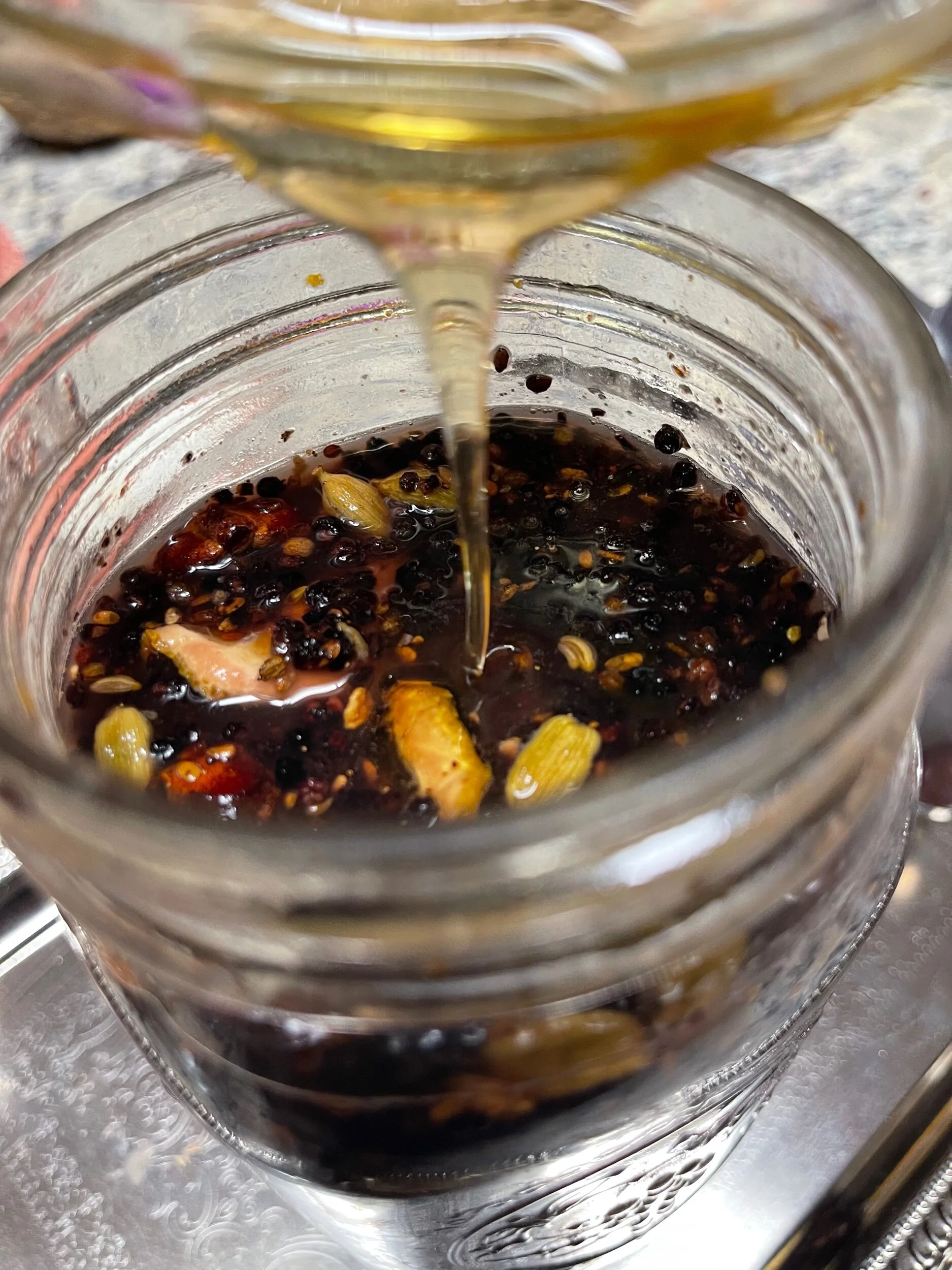Oxymels 4oz
Oxymel
oxymel. (ˈɒksɪˌmɛl). n. 1. (Medicine) a medicinal syrupy mixture of vinegar, honey and/or water.
What is an Oxymel - An oxymel is a medicinal preparation known for its amazing delicious mixture of a sweetener (honey, sugar, etc.) and vinegar. From there, other ingredients may be used to add to its medicinal properties for those wanting to opt out of using alcohol based preparations. With an oxymel, you get so many different options to choose from as far as uses goes for example, straight no chaser, added to any liquid of choice, use as a mock tail or even applied topically for more serious issues. This is where you find Fire Cider in the same category but is just a spicy version.
History of Origin - The word oxymel has it's origins rooted in ancient Egyptian text (Kemet), originally known as "oxalme" which meant “a mixture of salt brine and vinegar”, that was used for a variety of ailments, and to which they would often add honey. Then soon after, the Romans and the Greeks took this word on, and it was morphed into 'oxymel -(acid & honey)’ from which it has remained remarkably unchanged to this day.
The vinegar provides astringency. If you can imagine biting into a lemon, you'll have a good idea of what that action can feel like. What that puckering feeling is doing on a cellular level is creating more highly functioning mucosa (which lines quite a bit of your body).
Honey all by itself can act as a quite good antibacterial and demulcent. As a demulcent, it acts to sooth inflamed tissue, especially mucous membranes (think sore throats, gastritis, etc.). It also provides a medium for coating the mucous membranes of the mouth, throat, and stomach. In the context of the oxymel, this means that the other actions stick around longer in the places you want them to (think of honey like the bandage in the herbal formula-internally and externally).
Both honey and vinegar can act as expectorants. An expectorant is something that helps rid the body of phlegm. It works by thinning and loosening mucus in the airways, clearing congestion, and making breathing easier.
Why choose Oxymels - They are not only taken when sick with cold or flu, some are helpful to aid in getting a quicker absorption due to the astringent properties. Some oxymels help transform most herbal preparations that are not so great in taste to definitively surprising your taste buds. So if you have a hard time drinking teas or bitter tasting tinctures, opt for a yummy alternative that even the young ones can enjoy. Another reason to choose this preparation, it’s not as sweet as a syrup.
In conclusion : Remember to first speak with your medical provider or herbalist before trying herbal preparations if you are taking any prescribed medications.
WARNING - People should not use expectorants to mask the symptoms of a chronic cough that is due to smoking, asthma, chronic bronchitis, or emphysema. This will only worsen your condition.
Oxymel
oxymel. (ˈɒksɪˌmɛl). n. 1. (Medicine) a medicinal syrupy mixture of vinegar, honey and/or water.
What is an Oxymel - An oxymel is a medicinal preparation known for its amazing delicious mixture of a sweetener (honey, sugar, etc.) and vinegar. From there, other ingredients may be used to add to its medicinal properties for those wanting to opt out of using alcohol based preparations. With an oxymel, you get so many different options to choose from as far as uses goes for example, straight no chaser, added to any liquid of choice, use as a mock tail or even applied topically for more serious issues. This is where you find Fire Cider in the same category but is just a spicy version.
History of Origin - The word oxymel has it's origins rooted in ancient Egyptian text (Kemet), originally known as "oxalme" which meant “a mixture of salt brine and vinegar”, that was used for a variety of ailments, and to which they would often add honey. Then soon after, the Romans and the Greeks took this word on, and it was morphed into 'oxymel -(acid & honey)’ from which it has remained remarkably unchanged to this day.
The vinegar provides astringency. If you can imagine biting into a lemon, you'll have a good idea of what that action can feel like. What that puckering feeling is doing on a cellular level is creating more highly functioning mucosa (which lines quite a bit of your body).
Honey all by itself can act as a quite good antibacterial and demulcent. As a demulcent, it acts to sooth inflamed tissue, especially mucous membranes (think sore throats, gastritis, etc.). It also provides a medium for coating the mucous membranes of the mouth, throat, and stomach. In the context of the oxymel, this means that the other actions stick around longer in the places you want them to (think of honey like the bandage in the herbal formula-internally and externally).
Both honey and vinegar can act as expectorants. An expectorant is something that helps rid the body of phlegm. It works by thinning and loosening mucus in the airways, clearing congestion, and making breathing easier.
Why choose Oxymels - They are not only taken when sick with cold or flu, some are helpful to aid in getting a quicker absorption due to the astringent properties. Some oxymels help transform most herbal preparations that are not so great in taste to definitively surprising your taste buds. So if you have a hard time drinking teas or bitter tasting tinctures, opt for a yummy alternative that even the young ones can enjoy. Another reason to choose this preparation, it’s not as sweet as a syrup.
In conclusion : Remember to first speak with your medical provider or herbalist before trying herbal preparations if you are taking any prescribed medications.
WARNING - People should not use expectorants to mask the symptoms of a chronic cough that is due to smoking, asthma, chronic bronchitis, or emphysema. This will only worsen your condition.
Oxymel
oxymel. (ˈɒksɪˌmɛl). n. 1. (Medicine) a medicinal syrupy mixture of vinegar, honey and/or water.
What is an Oxymel - An oxymel is a medicinal preparation known for its amazing delicious mixture of a sweetener (honey, sugar, etc.) and vinegar. From there, other ingredients may be used to add to its medicinal properties for those wanting to opt out of using alcohol based preparations. With an oxymel, you get so many different options to choose from as far as uses goes for example, straight no chaser, added to any liquid of choice, use as a mock tail or even applied topically for more serious issues. This is where you find Fire Cider in the same category but is just a spicy version.
History of Origin - The word oxymel has it's origins rooted in ancient Egyptian text (Kemet), originally known as "oxalme" which meant “a mixture of salt brine and vinegar”, that was used for a variety of ailments, and to which they would often add honey. Then soon after, the Romans and the Greeks took this word on, and it was morphed into 'oxymel -(acid & honey)’ from which it has remained remarkably unchanged to this day.
The vinegar provides astringency. If you can imagine biting into a lemon, you'll have a good idea of what that action can feel like. What that puckering feeling is doing on a cellular level is creating more highly functioning mucosa (which lines quite a bit of your body).
Honey all by itself can act as a quite good antibacterial and demulcent. As a demulcent, it acts to sooth inflamed tissue, especially mucous membranes (think sore throats, gastritis, etc.). It also provides a medium for coating the mucous membranes of the mouth, throat, and stomach. In the context of the oxymel, this means that the other actions stick around longer in the places you want them to (think of honey like the bandage in the herbal formula-internally and externally).
Both honey and vinegar can act as expectorants. An expectorant is something that helps rid the body of phlegm. It works by thinning and loosening mucus in the airways, clearing congestion, and making breathing easier.
Why choose Oxymels - They are not only taken when sick with cold or flu, some are helpful to aid in getting a quicker absorption due to the astringent properties. Some oxymels help transform most herbal preparations that are not so great in taste to definitively surprising your taste buds. So if you have a hard time drinking teas or bitter tasting tinctures, opt for a yummy alternative that even the young ones can enjoy. Another reason to choose this preparation, it’s not as sweet as a syrup.
In conclusion : Remember to first speak with your medical provider or herbalist before trying herbal preparations if you are taking any prescribed medications.
WARNING - People should not use expectorants to mask the symptoms of a chronic cough that is due to smoking, asthma, chronic bronchitis, or emphysema. This will only worsen your condition.

